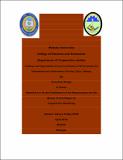| dc.description.abstract | There are two different types of seed marketing, known as formal and informal
(farmers’) seed supply. The formal seed supply sector is not well developed in
Ethiopia, it was able to provide only 10-20% of the actual seed demand and the
remaining demand has been supplied by the farmers’ seed system. The informal seed
system has been contributing a lot for the existence of the majority farmers’ economic
performance for many centuries and still offers many opportunities for the seed
security of farmers. However, the informal seed system has been performing in
Ethiopia in general and Tigray in particular at individual level and not as a business;
with almost no attention was given to improve the system through appropriate
research and investment. The study therefore was aimed at analyzing the seed
marketing challenges and investigates the Opportunities for Local Seed Business
Development in Endamekhoni and Atsbiwemberta Weredas of Tigray region,
Ethiopia.
The study was conducted by collecting data from primary and secondary sources of
seed marketing in the region, in three sample Kebelles of Atsibiwemberta and
Endamekhoni Wereda, which was selected purposively because of the existence of
Local Seed Business development pilot project supportive programme. Using random
sampling procedure and probability proportionate to size of the population data has
been collected from 147 total farmer respondents, of which 76 from Atsibiwemberta
and 81 from Endamekhoni woredas. The data was analyzed using different qualitative
and quantitative statistical procedures and methods. Both descriptive statistics like
mean, standard deviation, percentage, Chi-square tests and t-test etc and econometric
models were employed to study the relationship between the dependent and
independent variables.
A binary logit model was employed to analyze determinants of farmers’ participation
in seed marketing. Sixteen explanatory variables were included in the model of which
age of hhh was found negatively influencing whereas hhh’s knowledge, hhh’s access
of credit service, cooperative membership of the hhh, and hhh understanding on
importance of seed business, and existence of contract seed farming practice in thearea were found significant and positively influencing farmers’ participation in seed
marketing.
Based on the descriptive statistics, econometric models and focused group discussions
results of this study, awareness creation program, managerial and technical capacity
building of the seed producer society, seed business oriented extension system
designing, community based financial institution establishment, start up capital
support and long-term credit access, autonomous cooperative system promotion, link
seed producer societies with contract farming and market information systems,
support the seed producer societies to establish marketing infrastructure facilities are
suggested as potential recommendations to promote sustainable local seed business
development in the study areas. | en_GB |


